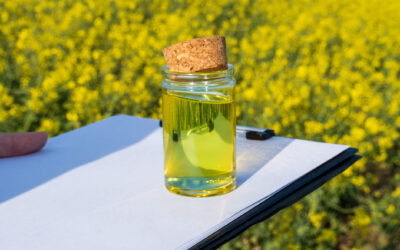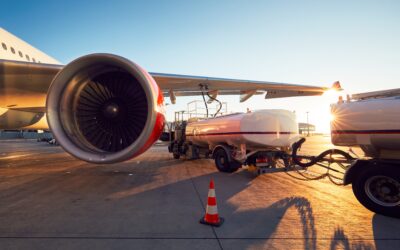We can all breathe a little easier, thanks to SAF
Sustainable aviation fuel (SAF) is a cleaner-burning fuel that’s good for our air and our economy.
Sustainable aviation fuel (SAF) has an important role to play for our environment, for the US economy, and for leading corporations dedicated to responsible growth. It helps secure the fuel supply to meet growing demand for air travel, provides new revenue streams for farmers, supports technological innovation in agriculture and biomanufacturing, and helps companies reduce aviation emissions while remaining competitive.
But what is SAF? How is it made? And why does it matter? Here are five things you need to know about SAF.
- SAF works in existing aircraft and infrastructure and is already benefiting our environment and economy today.
SAF is a safe, renewable, drop-in fuel, meaning it can be used with existing aircraft engines and fuel infrastructure without modification. SAF is currently approved at a 50/50 blend level with conventional jet fuel for commercial use. Blended SAF is flying aircraft right now, expanding America’s energy supply for aviation. While SAF currently makes up a small percentage of global jet fuel consumption, its use is expected to grow rapidly as demand increases. - SAF is a domestically produced biofuel that can be made in a number of ways.
There are multiple ways to produce sustainable aviation fuel using renewable feedstocks, including agricultural feedstocks such as non-edible cover crops; waste fats, oils, and greases; or renewable biomass. It’s the bio-based feedstocks, combined with how they are transported and processed, that result in SAF’s environmental benefits. - Using SAF is recognized as the most effective way to reduce aviation pollution and emissions, but much more is needed.
Sustainable aviation fuel can reduce emissions from air travel and transport by up to 85% over its life cycle, which includes production, distribution, transportation, and combustion. And SAF burns with very few particulates, which is good for our air, water, and land. The International Air Transport Association (IATA) estimates that SAF could contribute around 65% of the emissions reductions needed to meet the aviation industry’s environmental goals for 2050. However, SAF makes up less than 0.2% of jet fuel supply today. Bringing more SAF into the supply chain will enable the aviation industry to combine growth with responsible business operations. - SAF’s environmental and economic benefits go hand in hand.
Scaling up the production of SAF doesn’t just help the environment — it can also create new economic opportunities in the United States. For example, SAF production can stimulate growth in American agriculture by creating demand for agricultural waste and new crops that can be used as feedstocks. This expansion of the agriculture sector provides farmers with new revenue streams and strengthens local economies. The SAF industry is also driving US technological and biomanufacturing innovation, supporting America’s competitive advantage in these industries. - World Energy is leading the way in SAF supply, now and for the future.
As the world’s first commercial-scale producer of sustainable aviation fuel, World Energy has been leading the field of renewable biofuels for more than 25 years. Our SAF delivers best-in-class emissions reduction of up to 85% over its life cycle, and we are continually pushing the boundaries of energy innovation to exponentially increase production and improve our SAF’s environmental and economic benefits.
Our SAF is made entirely from certified renewable resources. We do not use food crops like corn, soy, or palm oil, which ensures that our SAF supports farming practices that are good for our land and water while avoiding potential impacts on our food supply.
Our SAF is certified by the Roundtable on Sustainable Biomaterials (RSB) and the International Sustainability & Carbon Certification (ISCC), and it meets the standards for the California Air Resources Board (CARB) Low Carbon Fuel Standard (LCFS) pathway. This means World Energy’s SAF delivers on the promise of a cleaner environment we can all enjoy.
Partnering for Change
We continue to partner with industry leaders to drive demand, encourage policy, and to gain approval for pure 100% SAF use in regular commercial aviation. Together we can enable a future of net-zero fossil-free flight.
We continue to partner with industry leaders to drive demand, encourage policies that support growth of the SAF industry, and increase the amount of SAF available to add to our energy supply.
A collaborative approach is the clearest path forward to reduce aviation emissions while protecting market competitiveness. Although SAF is widely recognized as the single most important tool for the aviation industry to decarbonize, production levels are not yet high enough. Leading corporations have partnered with World Energy to reduce their Scope 1 and 3 emissions from business travel or freight transport through SAF certificates (SAFc). These partnerships are critical for scaling SAF production to meet aviation’s needs. Together we can succeed in creating cleaner skies and stronger industries that benefit all of us.



